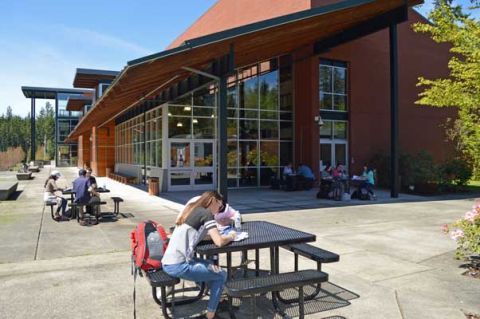Expanded Education Helps Mitigate Pandemic Insecurity
Image

The Kitsap and Olympic Peninsulas are some of the most underserved areas in the state in terms of access to a four-year college degree, and this deficit takes on even more urgency as the COVID-19 pandemic has starkly exposed how important educational attainment is to job security.
For the past 25 years, Western’s College of the Environment, the first interdisciplinary college of the environment in the United States, has provided residents of the Peninsulas with access to bachelor’s degrees in environmental policy and environmental science.
Since then, working closely with local partners from Olympic College branches in Poulsbo and Bremerton and Peninsula College in Port Angeles, Western has expanded access to bachelor’s degrees in various disciplines, including Business Administration, Business and Sustainability, Cybersecurity, Early Childhood Education, Education with Dual Endorsements in Elementary and Special Education, Human Services and Multidisciplinary Studies.
In recognition of the need to further expand access to higher education opportunities, the Washington State Legislature, during their session that ended in mid-March, included in their 2020 supplemental operating budget funding to reduce tuition rates and enhance access for resident undergraduate students in most four-year degree programs offered by Western Washington University on the Peninsulas.
Beginning this fall, the majority of students attending Western on the Peninsulas will see a 60 percent decrease in their tuition bill, with tuition for the 2020-21 year at WWU costing about $6,700 before accounting for students’ financial aid eligibility.
And thanks to the Washington College Grant, students from families of four making up to $50,500 per year will be able to attend WWU or another Washington college or university tuition-free, while students from families making up to $97,000 per year will pay a reduced tuition rate.
The demographics of students seeking educational opportunities on the Peninsulas is very different from students attending Western’s main campus in Bellingham or other residential colleges in the state. Of students enrolled in Western’s programs on the Peninsulas, 70 percent are age 25 or older, 56 percent are the first generation in their families to attend college, and nearly 50 percent are low-income or Pell Grant eligible. For these students, before the tuition decrease, the cost difference was even more of a barrier.
As Washington seeks to recover from the COVID-19 induced recession, there are economic lessons we can take from the Great Recession that began in 2008. According to a recent report by the Washington Roundtable titled “Path to 70% Credential Attainment: Restarting Amidst the COVID-19 Pandemic,” workers with post-high school credentials fared far better during the Great Recession and in recovery.
The peak unemployment rate across the country for workers with a high school diploma or less was more than two times the peak rate for workers with a bachelor’s degree or better. These data indicate that education beyond high school — specifically completion of bachelor’s and advanced degrees — is important and valuable for all workers, likely even more so for people of color and young workers who are being disproportionately impacted by the current recession.
Western also has an important role to play as a partner in local economic and social development, such as the public-private partnerships that resulted in establishing Western’s Kitsap County Small Business Development Center, which opened in June of 2019 and provides services at no cost to businesses and entrepreneurs. In the roughly 14 months that the Center has been open, Center staff have advised more than 321 clients with total annualized sales of $58.8.
The onset of the pandemic and economic dislocation dealt Washington students, families, educators, and communities unprecedented challenges. But with those challenges come opportunities to address systemic inequities, innovate and provide a stronger foundation for Washington’s young people. In building toward the future, it is vitally important that our state and our schools take clear steps to ensure and maintain education quality and rigor through the pandemic, address inequities, improve outcomes, and increase credential attainment.
The Washington Legislature and the state’s colleges and universities are committed to playing a collaborative and productive role in helping K-12 schools and higher ed systems make up for pandemic-related setbacks, knock down barriers to credential attainment, and support diversified, inclusive recovery and growth.
The effort to dramatically lower tuition rates at Western on the Peninsulas is an important step in this direction.
For residents of the Kitsap and Olympic Peninsulas, who may be place-bound by work or family and cannot travel to other universities in the state, having enhanced higher education opportunities nearby both brightens their futures and the long-term recovery and economic growth prospects for the area.
Sabah Randhawa is president of Western Washington University. Sen. Christine Rolfes represents the 23rd District in the Washington State Legislature and serves as Chair of the Senate Ways and Means Committee.